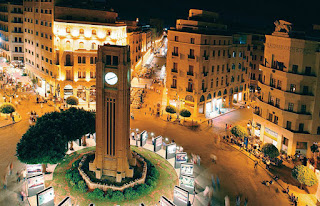Lebanon's People and the Monster they Created
It is in times of emergency that the real grit and resourcefulness of a people comes to the fore as they unite to face a pressing problem and come up with creative ideas and apply them rapidly and effectively. The fact is that crises, like the one we are in now as mountains of smelly garbage pile up on our streets, often reveal the true character of a people. Some people rise up to meet the challenge with stoic dignity and determination and help all those around them who are too old, too weak, too poor or too sick to help themselves. For other people, like the majority of ours, crises bring out their worst character flaws: quick to anger, foul mouthed, lacking courtesy or regard for others, totally wild and unpredictable. On top of all these comes the icing on the proverbial shit cake, passive aggression, which nicely complements barefaced aggressive behaviour so many locals are famous for.
I remember the summers I used to spend in Lebanon as a kid back in the turbulent 80s, the way I knew I was home was the overpowering smell of diesel oil and people shouting all the time at full volume from the airport to the streets to the neighbourhood, and not always in anger, just as a means to make themselves heard.
Our problem is not our corrupt political class, but the people who have implicitly accepted for decades this unwritten, surrealist social contract between the top and the bottom of society, between the powerful and powerless, between leaders and followers, one based on nepotism, favouritism, tribalism, regionalism and sectarianism. We, God help us, created this monster and fed it a rich fattening diet and now we complain that that very system, fat and creaking at the joints, has failed us. Really!
We feel that without this seriously flawed system, none of the country's various minorities, none of its various communities will get what is owed them. This overriding idea shows itself at both the macro and micro levels. When citizens petition government for some service or facility, there is often someone at any given department that is a friend of a friend or a distant cousin or someone from the same village to whom a citizen appeals to in order to ensure the gears of officialdom run smoothly. This seems to suggest that if one does not know anyone at a particular department that the gears of officialdom will not run smoothly. At least that is the folklore and firmly held popular belief.
Lebanon is not a large country, its population is smaller than that of an average size European metropolis, we have forgiving creditors that lend the public sector generously, i.e Lebanese depositors in Lebanese banks. In theory at least, we should have the means to get things done, to buy the best power plants, the best garbage incineration and recycling factories and install them in our country to solve our two pressing issues: abundance of garbage and shortage of electricity. Imagine a single solution that solves both! I doubt the bureaucratic mind can accommodate such a beautifully simple yet radical measure! In theory, our public services should be a model for other regional countries to emulate, just like we once were back in the 60s and 70s.
I think most Lebanese are aware of what is needed, know how to solve our pressing problems and one assumes that our government does too, and yet when we come to executing these ideas we face obstacles. It is as if those who stand in the way of vital public sector projects have only one motive, the sheer enjoyment they get watching the downcast, sullen look in the eyes of those whose project they blocked.
A British friend of mine recently remarked that Lebanon is a frustrating place where nothing ever gets done. But in a country where nothing moves and nothing gets done, the passing of time alone and the sheer physical force of a living breathing and growing population is sufficient to force change and not always the kind of change that is desirable. Every time I put out the garbage, two pathetically small bags, one containing organic matter plus paper plus cardboard and tissue paper and another containing crushed PET water bottles, plastic and nylon packaging of various kinds, tin cans and glass bottles, I wonder what four million such bags would look like and whether sweep-under-carpet solutions are enough now. If indeed such solutions are not enough and more longterm solutions are required, does our government have the courage and vision and executive muscle to take the necessary radical measures to solve this latest crisis properly?




Comments
Post a Comment